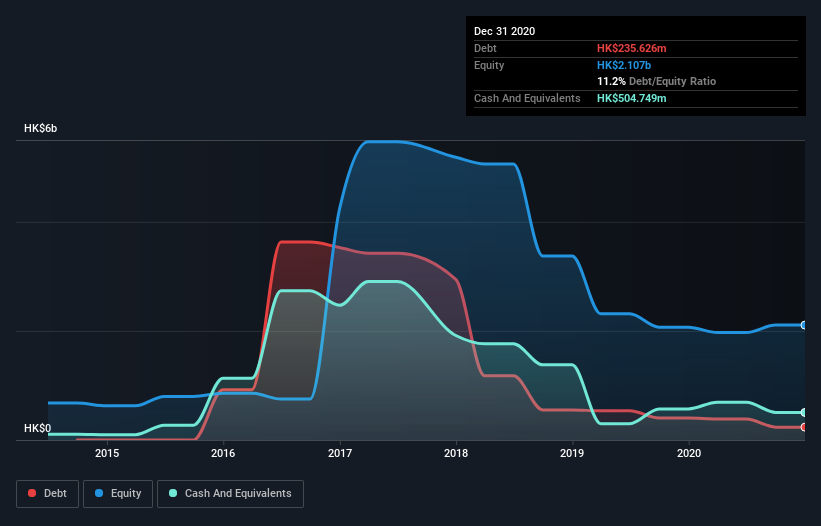
The external fund manager backed by Berkshire Hathaway's Charlie Munger, Li Lu, makes no bones about it when he says 'The biggest investment risk is not the volatility of prices, but whether you will suffer a permanent loss of capital.' It's only natural to consider a company's balance sheet when you examine how risky it is, since debt is often involved when a business collapses. We can see that Tai United Holdings Limited (HKG:718) does use debt in its business. But is this debt a concern to shareholders?
When Is Debt A Problem?
Debt is a tool to help businesses grow, but if a business is incapable of paying off its lenders, then it exists at their mercy. If things get really bad, the lenders can take control of the business. However, a more usual (but still expensive) situation is where a company must dilute shareholders at a cheap share price simply to get debt under control. Of course, the upside of debt is that it often represents cheap capital, especially when it replaces dilution in a company with the ability to reinvest at high rates of return. When we think about a company's use of debt, we first look at cash and debt together.
Check out our latest analysis for Tai United Holdings
What Is Tai United Holdings's Net Debt?
The image below, which you can click on for greater detail, shows that Tai United Holdings had debt of HK$235.6m at the end of December 2020, a reduction from HK$402.4m over a year. But it also has HK$504.7m in cash to offset that, meaning it has HK$269.1m net cash.

A Look At Tai United Holdings' Liabilities
Zooming in on the latest balance sheet data, we can see that Tai United Holdings had liabilities of HK$383.0m due within 12 months and liabilities of HK$3.94m due beyond that. Offsetting these obligations, it had cash of HK$504.7m as well as receivables valued at HK$968.8m due within 12 months. So it actually has HK$1.09b more liquid assets than total liabilities.
This surplus liquidity suggests that Tai United Holdings' balance sheet could take a hit just as well as Homer Simpson's head can take a punch. Having regard to this fact, we think its balance sheet is as strong as an ox. Simply put, the fact that Tai United Holdings has more cash than debt is arguably a good indication that it can manage its debt safely. There's no doubt that we learn most about debt from the balance sheet. But it is Tai United Holdings's earnings that will influence how the balance sheet holds up in the future. So if you're keen to discover more about its earnings, it might be worth checking out this graph of its long term earnings trend.
In the last year Tai United Holdings wasn't profitable at an EBIT level, but managed to grow its revenue by 38%, to HK$109m. With any luck the company will be able to grow its way to profitability.
So How Risky Is Tai United Holdings?
We have no doubt that loss making companies are, in general, riskier than profitable ones. And in the last year Tai United Holdings had an earnings before interest and tax (EBIT) loss, truth be told. And over the same period it saw negative free cash outflow of HK$76m and booked a HK$27m accounting loss. Given it only has net cash of HK$269.1m, the company may need to raise more capital if it doesn't reach break-even soon. Tai United Holdings's revenue growth shone bright over the last year, so it may well be in a position to turn a profit in due course. Pre-profit companies are often risky, but they can also offer great rewards. There's no doubt that we learn most about debt from the balance sheet. However, not all investment risk resides within the balance sheet - far from it. Case in point: We've spotted 2 warning signs for Tai United Holdings you should be aware of, and 1 of them is potentially serious.
Of course, if you're the type of investor who prefers buying stocks without the burden of debt, then don't hesitate to discover our exclusive list of net cash growth stocks, today.
If you decide to trade Tai United Holdings, use the lowest-cost* platform that is rated #1 Overall by Barron’s, Interactive Brokers. Trade stocks, options, futures, forex, bonds and funds on 135 markets, all from a single integrated account. Promoted
Valuation is complex, but we're here to simplify it.
Discover if Tai United Holdings might be undervalued or overvalued with our detailed analysis, featuring fair value estimates, potential risks, dividends, insider trades, and its financial condition.
Access Free AnalysisThis article by Simply Wall St is general in nature. It does not constitute a recommendation to buy or sell any stock, and does not take account of your objectives, or your financial situation. We aim to bring you long-term focused analysis driven by fundamental data. Note that our analysis may not factor in the latest price-sensitive company announcements or qualitative material. Simply Wall St has no position in any stocks mentioned.
*Interactive Brokers Rated Lowest Cost Broker by StockBrokers.com Annual Online Review 2020
Have feedback on this article? Concerned about the content? Get in touch with us directly. Alternatively, email editorial-team (at) simplywallst.com.
About SEHK:718
Tai United Holdings
An investment holding company, primarily invests in properties in the People’s Republic of China, Singapore, the United States, the United Kingdom, the Republic of Mongolia, Australia, and Belgium.
Low with imperfect balance sheet.
Market Insights
Community Narratives




